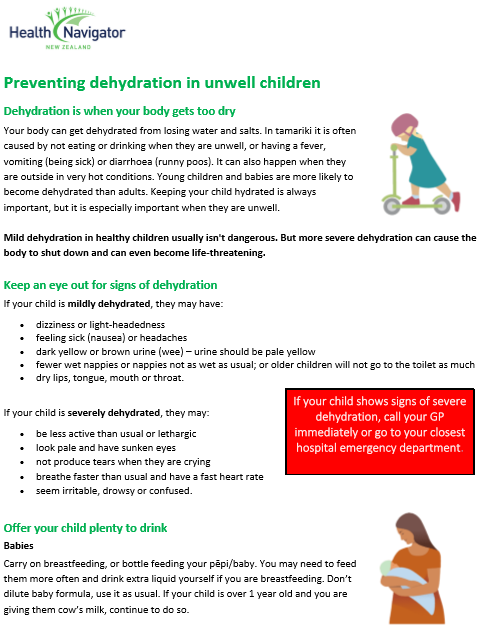 Image credit: Te Whatu Ora
Image credit: Te Whatu Ora
Low or no data? Visit zero.govt.nz, scroll down the page then click on our logo to return to our site and browse for free.
Cough, runny nose, sore throat
Key points about cough, runny nose or sore throat
- Do you have a new cough, runny nose or sore throat?
- Find out about symptoms, care at home and when to seek help
- These symptoms can also be the first signs of COVID-19 infection, so it is important to test for this.

The most common cause of a new cough, sore throat or runny nose is a viral infection such as a cold or the flu lasting 1–2 weeks. However, these symptoms can also be the first signs of COVID-19 infection, so it is important to test for this.
COVID-19 symptoms can include:
- a new or worsening cough in children or adults
- sore throat
- shortness of breath
- runny nose or cold symptoms
- fever
- loss of smell or change in taste
- shortness of breath
- upset stomach, possibly with diarrhoea (runny poo/hamuti) or vomiting (being sick).
Actions to take
- If you have any of these symptoms do a rapid antigen test (RAT) at home.
- Report your results at My Covid Record mycovidrecord.nz(external link) or call 0800 222 478.
- If your symptoms are mild, you can find helpful self-care tips below.
- COVID-19 positive: what steps do I need to take?
- If you have shortness of breath, this could be a sign of pneumonia (lung infection). See below for when to seek urgent medical advice.
- If you're unsure what to do, call Healthline 0800 611 116 or your pharmacy for advice.
Rest at home so you don’t spread bugs, and give your body time to recover.
Drink plenty of fluids, warm lemon and honey drinks or soups to avoid dehydration (honey is not safe for children under 1 year old).
If you have a sore throat, suck a teaspoon of honey or gargle with salt water. Adults can also try using a gargle, throat spray or pain-relief (anaesthetic) lozenges.
For a blocked or runny nose you can try a decongestant and saline nasal spray. Also try sleeping propped up on pillows.
For a cough sip a lemon and honey drink or ask your pharmacist about cough lozenges or medicines that may be suitable for you. Cough medicine doesn’t cure a cough but may give you some relief. Read more about cough in children, cough in adults and cough medicines.
If you have post-nasal drip, sleep propped up and you can also try saline rinses, decongestants or antihistamines.
Use your inhaler if you have asthma.
For aches and pains try paracetamol, ibuprofen OR cold and flu medicines. Ask your doctor or pharmacist what is safe for you.
Check doses carefully to make sure you don't double up as many cold and flu medicines contain paracetamol or ibuprofen.
Avoid antibiotics as they can’t cure colds, flu or COVID-19 as these are caused by viruses.
Avoid strenuous exercise such as running or swimming. In rare cases, viral infections can affect your heart – at any age.
|
Contact your healthcare provider for advice if you: |
|
|
Seek urgent medical advice if you or someone you are caring for develops any of these danger symptoms: |
Call 111 urgently and ask for an ambulance. |
Apps reviewed by Healthify
You may find it useful to look at some Self-management and healthy living apps.
- Wash your hands regularly for 20 seconds and dry them well
- cover your coughs with a tissue or cough into your elbow, then wash your hands
- don’t cough near others
- avoid touching your face
- don’t share cups, utensils or towels
- clean and disinfect surfaces often
- stay home if you are sick and avoid close contact with others.
Apps
Self-management and healthy living apps
Brochures
Got a cold or flu? Find out what to do brochure(external link)(external link) Health Promotion Agency, NZ & Healthify He Puna Waiora, NZ
Got a cold or flu? Find out what to do factsheet(external link)(external link) Health Promotion Agency, NZ & Healthify He Puna Waiora, NZ
Protect yourself and others from COVID-19(external link)(external link) Unite Against Covid, NZ, 2020
A guide for household sore throat management(external link)(external link) Heart Foundation, NZ, 2019
A guide for household sore throat management(external link)(external link) Heart Foundation, NZ, 2019
Preventing dehydration in unwell children [PDF, 192 KB] Healthify He Puna Waiora, NZ, 2022
Virus action plan (adults)(external link) He Ako Hiringa, NZ te reo Māori(external link), Samoan(external link), Tongan(external link), Arabic [PDF, 188 KB], Hindi(external link), Chinese (simplified)(external link)
Virus action plan (child over 6 months)(external link) He Ako Hiringa, NZ te reo Māori(external link), Samoan(external link), Tongan(external link), Arabic [PDF, 214 KB], Hindi(external link), Chinese (simplified)(external link)
Brochures

Healthify He Puna Waiora, NZ, 2022

Heart Foundation, NZ, 2019

Health Promotion Agency, NZ & Healthify He Puna Waiora, NZ
Credits: Healthify editorial team. Healthify is brought to you by Health Navigator Charitable Trust.
Page last updated:





